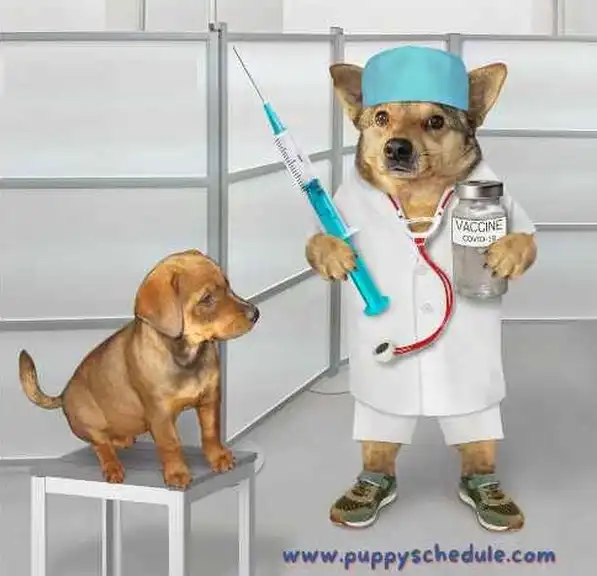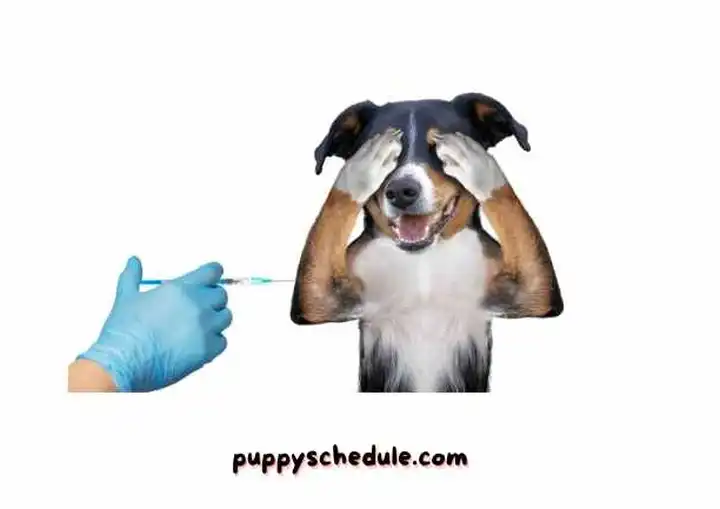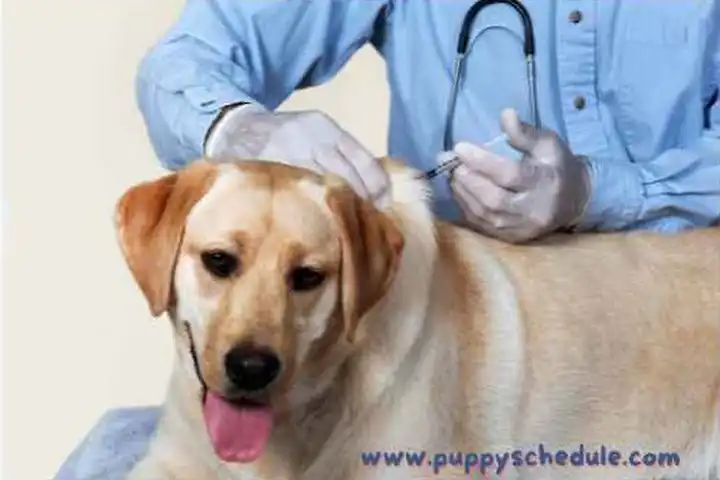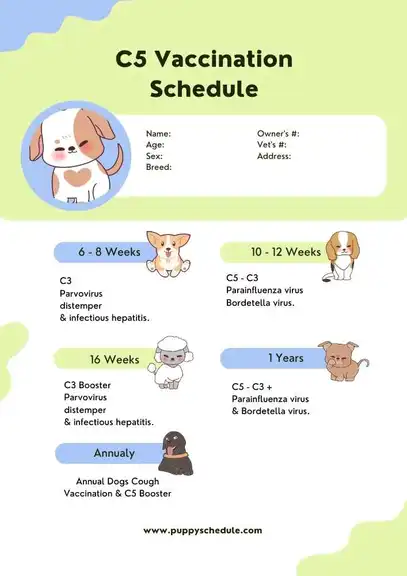The Ultimate Guide to C5 Vaccination for Dogs: Benefits, Side Effects – As a conscientious pet owner, taking all possible measures to feed your dog well-being and safety is necessary. Immunization is a fundamental aspect of preventive healthcare, with the C5 vaccine being integral.
This guide will provide in-depth knowledge about C5 vaccination for dogs. It contains information on the advantages, potential side effects, immunization timetables, and preventive measures gathered from credible sources such as veterinarians and animal behaviorists.
Benefits of C5 Vaccination for Dogs

Veterinarians and animal behaviorists strongly advocate for administering C5 vaccination to dogs, which protects from five distinct infectious diseases – parvovirus, distemper, hepatitis, parainfluenza, and Bordetella bronchiseptica.
According to Dr. Sarah Cavanaugh, a veterinarian with VCA Animal Hospitals, administering C5 vaccination is integral to preventative maintenance for dogs as it protects against multiple serious and possibly fatal conditions such as parvovirus and distemper. These infectious ailments can easily spread between dogs in parks, kennels, or daycare centers.
Dr. Jason Stull, a veterinarian and public health expert at The Ohio State University, asserts that vaccination is an indispensable method of hindering the transmission of contagious conditions between animals and humans. Consequently, vaccinating your canine not only safeguards them but also aids in curbing the dissemination of contagions within one’s community.
It is vital to recognize that vaccination is not a single occurrence. Dogs necessitate frequent booster shots to sustain resistance against these conditions.
The American Animal Hospital Association (AAHA) suggests that puppies obtain their first C5 vaccination at 6-8 weeks, with booster shots every 2 to 4-week intervals until 16-20 weeks old. Beyond this point, boosters should be administered annually or as frequently as once in three years, depending upon each canine’s lifestyle and possible exposure risks.
Vaccination of pets is an important aspect of responsible pet ownership. Immunizing your canine can safeguard them from severe and fatal diseases and help contain illness transmission in your locality. It is essential to consult a veterinarian to identify the most suitable vaccination program for your dog, which is established on age, lifestyle, and all-around wellness.
Possible Side Effects of C5 Vaccination

Though most dogs endure either no or minimal consequences following this vaccine, it remains vital that owners are mindful of the dangers involved.
It has been understood to generate considerable side effects, some of which may include:
- Mild fever
- Lethargy
- Loss of appetite
- Swelling or discomfort in the injection area
- Allergic reactions, including hives, itching, or difficulty breathing
Occasionally, dogs may suffer from more extreme side effects like anaphylaxis or autoimmune illness. If you observe any of the following signs after your dog’s C5 immunization, reach out to your vet without delay:
- Severe vomiting or diarrhea
- Swelling of the face, eyes, or tongue
- Difficulty breathing or collapse
- Seizures or other neurological symptoms
Reducing the Risk of Side Effects
Adhering stringently to your veterinarian’s instructions is imperative to avoid potential adverse effects. It includes heeding the specified amount and duration of medication administered.
Veterinarians are educated to assess the appropriate dosage accurately based on a dog’s mass and other necessary considerations. Administering too much medication can result in an overdose, while administering an insufficient quantity may not be effective.
If your dog is taking any other medications, be sure to tell your veterinarian about them. Many drugs can interact with each other and cause side effects.
It is of the utmost importance to inform your veterinarian regarding any other medications, supplements, or health conditions about your canine. Interactions between certain prescription drugs or existing medical issues can result in adverse effects or further complications.
Keeping a close eye on your canine companion upon beginning any new medication is recommended to minimize the chances of side effects. If you observe any changes in their behavior, appetite, or level of energy, then it would be wise for you to contact your veterinarian without delay; caution must always take precedence when considering the health and well-being of your puppy.
What to Do if a Dog Experiences Side Effects
If your pet suffers from any side effects, it is essential to take immediate action. Certain adverse reactions may be significant and even potentially deadly. The following steps can be taken:
Contact Your Veterinarian: Contact immediately and give an accurate account of your dog’s signs. Your vet may advise ceasing the administration of medication or altering dosage levels.
Follow Your Veterinarian’s Instructions: It is advisable to heed your veterinarian’s advice and bring along any medications or supplements that your dog may be taking when you take them in for their examination.
Monitor Your Dog Closely: It is important to closely monitor your dog’s symptoms and behavior. If there are any fluctuations or new indicators arise, it is recommended that you contact a veterinarian promptly.
Provide Supportive Care: Your veterinarian may suggest supportive care to help control your dog’s symptoms. It could include medications designed to reduce discomfort and pain, as well as rest and the promotion of hydration.
The prospect of taking medication may be a cause for concern; however, there are steps one can take to decrease the likelihood of negative side effects. Strictly following instructions from your veterinarian and monitoring for any signs that could indicate difficulty is recommended to decrease potential harm due to treatment.
If unwanted reactions occur, you must contact your vet immediately and fulfill whatever guidance they offer regarding care.
Duration of C5 Vaccination
The extent of immunity achievable from C5 vaccination can be variable depending on a wide range of factors such as the age, health condition, and lifestyle of the canine in question and the immunization product utilized.
As per the American Animal Hospital Association’s 2017 Canine Vaccination Guidelines, core vaccines such as C5 are typically effective for three years in healthy adult dogs. Nevertheless, depending on their particular risk factors, some canines may need to be vaccinated more frequently.
Collaborating with one’s veterinarian to make a vaccination plan that caters specifically to their dog’s requirements is vital. In some cases, this could include regular blood tests to estimate the antibodies within your canine’s body and whether extra vaccinations are required.
Maintaining accurate records of your canine’s vaccinations is of utmost priority. Certain boarding facilities, grooming salons, and other establishments may require proof of vaccination before permitting access to the dog.
How Much Does C5 Vaccination Cost for Dogs?

The price of C5 vaccinations may differ depending on various factors, including your locality, the veterinary clinic you attend, and any additional services provided during the appointment.
According to Dr. Jennifer Coates, a veterinarian, and writer for PetMD, the cost of the C5 vaccine may vary from approximately $50 to $100 per dose. Although this amount appears quite expensive, it is worth investing in to protect one’s pet from potentially fatal diseases.
The Recommended C5 Vaccination Schedule for Dogs

The suggested immunization timetable for C5 vaccination can be contingent upon one’s canine companion’s age and general well-being.
According to Dr. Jennifer Adolphe, a veterinarian and senior nutritionist at Petcurean,
“Puppies should receive their first C5 vaccine between 6 and 8 weeks of age, with booster shots administered every 3 to 4 weeks until they are 16 weeks old.”
It is recommended that adult dogs receive a booster shot every three years. However, this may vary depending on what your veterinarian deems necessary for your dog’s needs.
Precautions to Take When Vaccinating Your Dog with C5
It is essential to adhere to the recommended steps when vaccinating a dog with C5. It is pertinent that all safety measures are taken into account for the vaccine to be effective and safe. The following considered:
Talk to your veterinarian: It is imperative to consult with your veterinarian about the vaccination requirements and schedule for your pet. Your vet can evaluate the health status of your canine and suggest an appropriate immunization plan that considers their age, lifestyle, and the potential risk of contagion from these illnesses.
Monitor your dog after vaccination: Following a vaccination, it is imperative to observe the animal for any indications of antagonistic reactions, including inflammation, discomfort, fever, or reduced energy. Should you detect any of these symptoms, contact your veterinarian straight away.
Avoid over-vaccination: Vaccination is of utmost importance; however, it is noted that excess could cause harm to a canine’s health. Dr. Ron Schultz, a veterinarian, and immunologist at the University of Wisconsin, have proclaimed that dogs only necessitate vaccination as frequently as they previously had been receiving them. He suggests core vaccinations like C5 are only necessary every three years or less, depending on their conditions.
Consider your dog’s lifestyle: Pets that are often present in locations with a greater likelihood of exposure to diseases, for example, dog parks or kennels, may necessitate more frequent vaccinations compared to those which primarily remain at home. You should discuss your pet’s lifestyle and any additional vaccines required with your vet so they can be properly safeguarded.
Avoid vaccinating sick dogs: If your canine is unwell or has a weakened immune system, it cannot deal with vaccination efficiently. Therefore, in such cases, it may be prudent to defer immunization until the animal’s health improves.
It is advisable to take certain precautions for the C5 vaccination of your pet to be both safe and effective.
References:
The Ohio State University. (n.d.). Canine Vaccines: What You Need to Know. https://vet.osu.edu/
American Veterinary Medical Association. (2019). Vaccinations for Your Pet. https://www.avma.org/resources/pet-owners/petcare/vaccinations-pets.
Can Pregnant Dogs Get the C5 Vaccine?
However, when vaccinating pregnant dogs, the decision is not so straightforward. According to the American Veterinary Medical Association, the safety of vaccination during pregnancy has not been extensively studied in dogs. There is limited information on the potential risks to the developing fetus.
While there is no definitive answer, many veterinarians err on caution and recommend against vaccinating pregnant dogs, especially during the first trimester. It is because the developing fetus is most vulnerable during this time, and there is a small risk that the vaccine could cause harm.
If your dog is not pregnant, it’s generally recommended that she be vaccinated with the C5 vaccine. The vaccine can be given to puppies as young as six weeks old, and it’s important to follow your veterinarian’s recommended vaccination schedule to ensure that your dog is protected against these dangerous diseases.
The decision to vaccinate a pregnant dog with the C5 vaccine is made on a case-by-case basis in consultation with a veterinarian. While the vaccine can protect against disease, the potential risks to the developing fetus are carefully considered.
Conclusion
By getting your dog vaccinated with the C5 vaccine, you can protect them from several infectious diseases and keep them healthy. We hope this guide has given you the information to make informed decisions about your furry friend’s preventative care.



